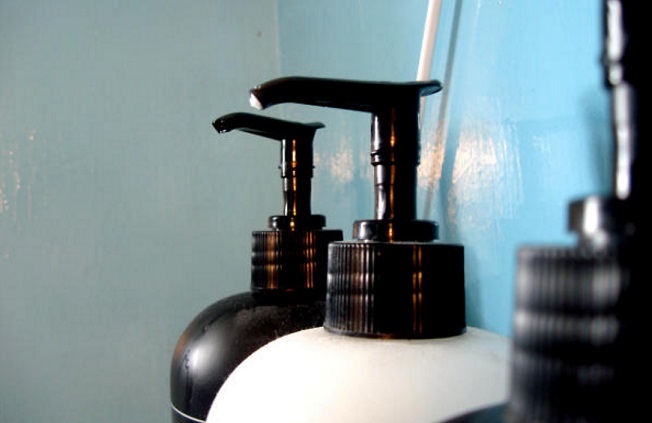Today’s question: can you use human shampoo on dogs? Scroll down for detailed answers.
On an otherwise quiet Sunday night, the stores have all closed, and your dog just rolled around in mud. You need to clean your dog, but you do not have any dog shampoo lying around the house. Shampoo is simply soap made for hair, therefore, soap should be able to used on anyone, despite whether the hair is human hair or fur…right? Hair is hair? Soap is soap? While this train of thought is great when standing upon a muddy dog in the middle for the night, this thought is not always true.
Can you use your human shampoo on your canine companion? While shampoo made for people will indeed clean the spots out of Spot, is it really good for him? Are there dangerous chemicals in human soap and shampoo? While this may seem to be a trivial issue, the issue of whether to use a certain type of soap can affect your pup more than you might realize.
Can you use human shampoo on dogs?
The short answer is: yes, once in a while. However, frequently using human shampoo is not recommended. When all of the stores have closed and your dog has run amok, you may use shampoo on your dog. Using shampoo once in a while is better than allowing your dog to remain muddy/dirty until you are able to take a trip to the shops. However, attempting to wash the fur of your dog with your particular shampoo on a regular basis is not advised, and will not produce the same effect of softness on the dog’s fur that the shampoo does to your hair.
Read the below paragraphs for detailed explanations.
Easy to forget dogs have skin, not just fur
The first thing to understand is that there is a difference between people skin and dog skin. An important skin component on both humans and dogs is known as the “acid mantle,” which is a slightly acidic layer that coats the skin.
This coating functions as a barrier that protects the outer porous layer of skin, called the stratum corneum, from environmental radicals such as viruses and bacteria. This layer is tasked with absorbing water and preventing excessive evaporation, keeping the skin hydrated. When bathing with soap and/or shampoo, this acid mantle washes away.
Many soaps and shampoos contain moisturizing elements in order to combat this result, providing a level of moisture that protects the skin until it can replenish its outer oily layer. If left un-moisturized and without the acidic layer, skin can become dry, flaky, irritated, or even develop a rash. The skin that becomes dry can be irritated beyond tolerance level. The skin may also flake and create dust and allergens in your home.
Using a human shampoo on dogs can disintegrate this layer and lead to extreme dryness and itchiness. A dog will then begin to chew his or her skin attempting to relieve the itch. The chewing of the skin then turns to extreme irritation, pain, and possible infection. Using a luxurious shampoo on your dog to add fluffing to Fido’s hair will not happen as often as people may think. The reverse is true, drying the fur and skin our so much the dog will chew itself ragged. No one likes dry hair and an itchy scalp, especially a dog without the ability to understand the issue could have been prevented by avoiding shampoo.
Keep in mind that every type of skin has its own pH balance, humans and dogs included. The pH scale ranges from 0 to 14, with levels less than 7 considered acidic, and levels higher than 7 considered alkaline, or basic.
For humans, the pH level of skin is usually found to be between 5 and 6. This means that human skin tends to be more acidic, hence shampoos and soaps are specifically formulated to maintain these levels.
pH levels are key
Since human skin is different from that of a dog, consider that the pH levels must be too. Depending on the size, breed, gender, and climate in which a dog lives, the pH levels of a dog’s skin can range anywhere from 5.5 to 7.5, generally trending towards a more alkaline, or basic, concentration.
Using basic chemistry (and logic), one finds that using a human shampoo on a dog will disrupt the natural pH level of its skin, throwing off the pH balance of the acid mantle. This, in turn, could potentially create an environment suitable for increased levels of bacteria, parasites, and even viruses.
These increased levels of bacteria and the like can create infections and increased smell, caused by this upset in pH balance. Oblivious dog owners could potentially continue to wash their dog with human shampoo, which would only serve to complicate the problem. Also keep in mind that if a shampoo does not contain a moisturizing agent, it could potentially create dry skin for a dog, which might then proceed to scratch at its skin, possibly creating lesions or skin infections, only worsening the problem for a dog.
Ideally, just as one would use a shampoo suitable for one’s own scalp, one should find a shampoo made for dogs and that is suitable for your dog in particular. Find a shampoo with a pH balance made specifically for a dog’s skin. Most dog shampoos are in the neutral range on the pH scale, which are more or less around 7. Check the pH level on the label of the shampoo to be 100% sure it is okay for your pup.
Shampoo with purpose
The particular shampoo you choose for your dog should depend on the reason for the bath. While there are many all-purpose dog shampoos, there are also specially formulated shampoos that can be medicated or therapeutic and can be used to treat a range of different issues. Many dog owners are under the impression their own personal shampoo that smells great will also make their dog smell great. A stinky dog is not remedied by a regular shampoo smelling of roses. The reverse happens, creating the dog to become smellier, itchier and generally unhappy. Just as using the wrong shampoo on your hair can cause you to feel out of whack, a shampoo made for humans will offset the natural balance of a dog as well.
Dry skin, dandruff, itchy skin, infected skin, and fleas and/or ticks are all issues that a particular dog shampoo could be suited for. Shampoos have special concentrations to prevent and alleviate dry skin symptoms dogs’ face. Human shampoos just do not have this particular ability. While a dandruff shampoo you have on hand at home any be used in a pinch, on rare occasions, regularly using dry skin and hair shampoo is just not the same as using a dry skin shampoo created for dogs.
There are also health issues to take into consideration in regards to shampoos. Those who produce doggie shampoo must have specific testing completed and are to be reviewed regularly to be up to state codes and standards. Human shampoo companies must do this as well, but not to be certified as safe for a dog-only for humans. Company’s deemed safe by the powers that be may take extra care in creating the soap used for your canine.
Also, be sure not to wash your dog too regularly. Keep in mind that dogs in their original and natural habitats did not have the luxury of bathing, as they were designed to be “self-cleaning.” Previous generations of dogs living within the mountains did not have a preference for one shampoo or the other, or much care for the feel of the lather. Your dog will not know the difference between a dog shampoo or your special shampoo. Do not be fooled into thinking your dog will prefer your shampoo and the softness the shampoo promises. The dog will not benefit from the human components of shampoo.
Dogs also do not ‘feel dirty’ per se as a human may. A dog only needs a bath and proper grooming on occasion, not daily or weekly, or as often as you may think. Wild dogs do not have the luxury of regular bathing, or sweet smelling soap, and those dogs have done just find remaining in the world. Your dog will not die out from lack of a daily bath or human shampoo. A dog’s dead skin cells are designed to move along the hair shafts and flick off of the ends naturally, so most dogs will not require frequent bathing. While there is not a specified frequency in which to was your dog, do not shampoo your pup more than once a week.
Before shampooing your dog, keep a few things in mind. Are you using the correct shampoo? Make sure the shampoo concentration is specifically formulated for dogs and has the correct pH balance as to not upset your furry friend’s skin. Every breed of dog is unique, and the fur and skin type are unique. Keep these facts in mind when shopping for a cleanser for your particular dog. If your dog has a specific problem that needs addressing through washing, be sure to use a shampoo designed to combat or prevent that specific problem. A veterinarian or groomer will be able to offer good advice upon which soap and shampoo is recommended for your dog’s particular breed, fur type, and possible allergies.
Finally, be sure not to wash your dog too much. Dogs are not meant to be cleaned on a regular basis; their hair does it for them. Your dog is a self cleaning machine, human interruption can and will offset their natural ability to keep themselves clean, healthy, and comfortable. If you follow these instructions and keep these tips in mind, your dog will be clean, fresh, and happy in no time!
References:
http://www.petmd.com/dog/grooming/evr_dg_shampoo_for_dogs
http://www.petshed.com/petcyclopedia/how-to-wash-dog-properly.html








Leave a Comment